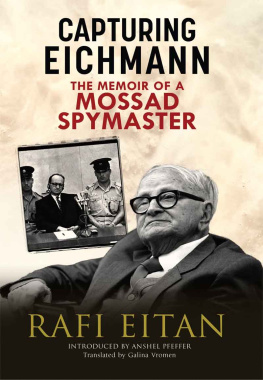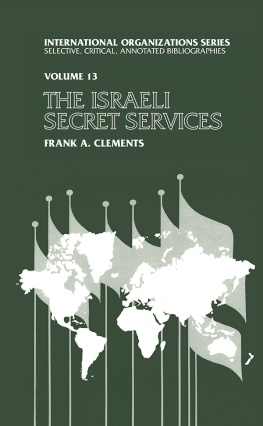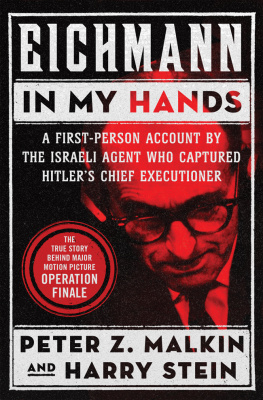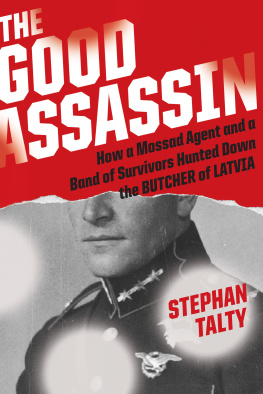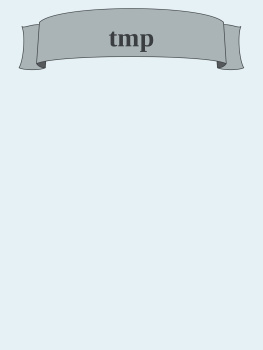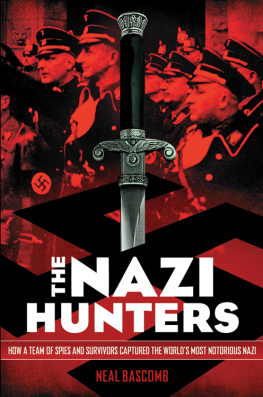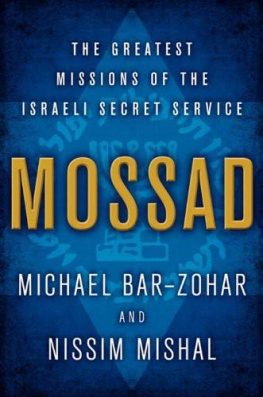Pagebreaks of the print version

CAPTURING
EICHMANN
CAPTURING EICHMANN
THE MEMOIRS OF A
MOSSAD SPYMASTER
RAFI EITAN
Introduction by
Anshell Pfeffer
Translated and Abridged by
Galina Vromen
Capturing Eichmann
This English-language edition
first published in 2022 by
Greenhill Books,
c/o Pen & Sword Books Ltd,
47 Church Street, Barnsley,
S. Yorkshire, S70 2AS
www.greenhillbooks.com
ISBN: 9781784387570
eISBN: 9781784387587
Mobi ISBN: 9781784387587
All rights reserved.
Originally published in Hebrew as The Secret Man
Text Yuval R. Eitan
Anshel Pfeffer introduction Greenhill Books, 2022
Galina Vromen translation Greenhill Books, 2022
The right of Rafi Eitan to be identified as author of this work has been asserted in accordance with Section 77 of the Copyrights, Designs and Patents Act 1988.
CIP data records for this title are available from the British Library
Plates
Rafis brothers and their parents in a family group from the later 1950s.
Introduction
Rafi Eitan spent the first day of the state of Israels independence crawling down a hill in the Galilee. He had been wounded by a mortar shell fired by the Lebanese Army and was nearly abandoned by his retreating comrades. Had he died there in the Battle of Malkiya at the age of 21, he would have never known that the Jewish state had been founded by David Ben-Gurion in Tel Aviv the previous afternoon.
He survived and for the next four decades was one of the central figures laying the foundations for Israels secret state, first as an agent of the Shin Bet internal security service, then as an operations chief in the Mossad spy agency and finally as the last head of the small, rather obscure intelligence service, that ended up causing the biggest crisis in the history of Israels relations with its main ally the United States.
Eitan throughout his life was never one for hiding his thoughts and opinions from his superiors, and he doesnt spare his readers either, though he left it until shortly before his death to prepare these memoirs. He died in March 2019, at the age of 92, and the memoirs were published posthumously. One of the first secret missions he was sent on, as a 19-year-old junior commander in the Palmach pre-state militia, was to deter German Templer farmers who were seeking to return to the farms they had been forced to abandon in British Mandatory Palestine at the start of the Second World War. Without hesitation, he shot two of them dead in front of their families.
Once he began his career as a secret policeman, he was clear that his mission included not only uncovering Soviet moles, who had been sent to Israel under the guise of Jewish immigrants, but also making sure that Ben-Gurions Mapai party remained in power by keeping tabs on its political rivals. In Israels early days a quarter of the parties in the Knesset, Israels parliament, were under his surveillance as were other targets not usually considered the business of intelligence services such as tax-evaders. In 1955, he even proposed to Prime Minister Ben-Gurion to carry out a ballot-stuffing mission which would guarantee his victory in the upcoming election.
The most famous of the missions he commanded will always be Operation Finale, the kidnapping to Israel of Adolf Eichmann, mastermind of the Third Reichs Final Solution, the plan to exterminate European Jewry. But the detailed and inventive stratagems he devised for capturing and then spiriting Eichmann out of Argentina, which have since become the subject for numerous books and films were just one of countless creative operations Eitan planned and led. Many of these remain secret to this day.
Eitan claims that he didnt consider heavy-handed assassinations as always the best way of achieving results, but he had no problem resorting to them when he believed they were in the interests of Israels survival. He was very clear that ensuring survival was always his foremost and overall mission, but he could sometimes be very pragmatic when going about it. Over the years his tactics would include the most unorthodox methods, such as enlisting even former Nazi officers, including SS Colonel Otto Skorzeny, as collaborators in the campaign to deny Egypt weapons of mass destruction.
Eitan was of the school that saw Israels spy services not only as agencies for carrying out intelligence-gathering and clandestine operations, but also as tools of diplomacy. As a senior Mossad officer he undertook secret overtures to regimes around the world which had no diplomatic relations with Israel, from Morocco to China. He was years, often decades, ahead of his time in trying to open secret channels of dialogue with Israels enemies, such as Egypt and even Yasser Arafats Palestine Liberation Organisation. He was no dove, and he makes it clear he believed that Israel would have to continue fighting for its survival for generations to come, but he believed in doing everything possible to try and remove enemies out of the equation. By every means possible means, even peace.
But while Eitan played a major part in building up Mossad to the status of one of the worlds most respected, and feared spy agencies, he was also involved in some of Israeli intelligences greatest failures, that demonstrated the limitations of a governments reliance on its spies. In the late 1970s and early 1980s he was one of the architects of Israels alliance with the Lebanese Phalanges which led to two decades of tragic Israeli involvement in Lebanon and the foundation of Israels mortal enemy Hezbollah. But while he was only a supporting actor in that tragedy, in the spy scandal that would rock Israels relations with the United States in 1985 he was the man left holding the pieces when a Jewish-American Naval Intelligence analyst was arrested for spying for Israel.
Perhaps the cruellest irony of Rafi Eitans long life was that the man who commanded the mission to bring Eichmann to justice in Israel, the one event that emphasised more than any other Israels historic role as the guarantor of the Jewish peoples fate, was also responsible for the traumatic event that inflamed the tension and conflicts of the dual loyalty of Diaspora Jews, to their own homelands and to Israel.
Eitan was in charge of Jonathan Pollards recruitment, his handling and ultimately his abandonment, when the spy and his wife were forced to leave Israels embassy in Washington and promptly arrested outside by the waiting FBI agents.
Its no coincidence that in these memoirs, Eichmanns capture receives two detailed chapters and Pollards only a few cursory pages. Whether Eitan withheld the full details of his association with Pollard due to his own personal shame or the sensitivities of the Israeli government, which linger nearly four decades after the events, is left to the readers imagination.
In the aftermath of the Pollard debacle, Lekem, or the Bureau for Scientific Relations, was disbanded and Eitan, its last chief, was retired in disgrace. Eitan was never to realise his dream of becoming Mossad chief and was supposed to have faded away into private life, making a fortune from a farming business in Fidel Castros Cuba. But such was his irrepressible nature that he never really went away, keeping up close relationships with Israels leaders to whom he was a friendly supplier of fine Cuban cigars and, after a lifetime in the shadows, making a comeback in 2006, at the age of eighty, as the unlikely leader of the short-lived Pensioners Party, which he represented in the Knesset and as a minister in Ehud Olmerts Cabinet. He simply couldnt keep away. But his brief political adventure was also a failure, highlighting his lack of suitability to a more open and democratic era in Israels history.

